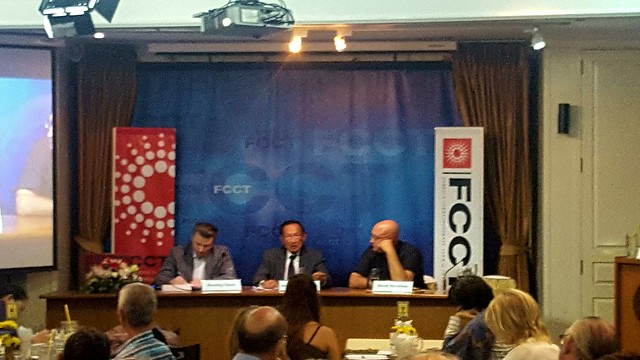At a seminar discussing the contents of the draft constitution in the upcoming referendum, political experts made clear that these updated legislation reduces democracy, and increases the junta’s control of future Thai politics.
In the evening of 3 August 2016 at the Foreign Correspondents Club of Thailand, Dr David Streckfuss of Khon Kaen University, Dr Suchit Bunbongkarn of Chulalongkorn University, and Henning Glaser of Thammasat University, participated in a panel discussion which talked through the contents of the upcoming draft charter referendum occurring 7 August 2016.
The contents in this constitution, as Dr Suchit said, gives power to the junta to “set up the government.” This is reflected in the composition changes to the legislature.
The Thai National Assembly (NA) is made up of two bodies, the House of Representatives (HoR), and the Senate, which both have proposed structural changes in this draft constitution.
Streckfuss looked at other constitutions to see how the proposed constitution compares. Relatively, this draft “is going away ... from democratic aspirations of people in the north and throughout the country”, Streckfuss said.
In comparison to the legislative structure of the 1997 and 2007 constitutions which had 100% and 88% of elected officials, respectively, in the HoR, only 70% would be elected in the current draft charter.
Glaser discussed how in the draft constitution, the senate, for the first five years, would be made up of 250 members, and “would be appointed basically by the NCPO.” Thus, in addition to the 500 members of the HoR, the NA would consist of 750 members.
He also discusses how question two of the referendum is of crucial importance to the government, because it is the only way continuity can be guaranteed.
If both questions of the referendum pass, Glaser explained that the senate would participate in the selection of the next Prime Minister, whereby 376 votes out of 750 members will be needed for the appointment. He adds that “if the senate is voting in a block, and we can assume that, we have 250 votes of the senate, plus only 126 votes out of 500 elected votes to select the Prime Minister.”
What is worse is that, as David Streckfuss explained, impeachment powers have been dropped out of this constitution, so there would be no ability to overturn the selected Prime Minister if problems arise.
Furthermore, without the Senate being mixed between elected and appointed, the chances of passing an amendment in the new constitution would be very difficult as well. With these measures in place, there will be no going back from this constitution.
Streckfuss also warned that voters should also consider that there are no provisions in place to relinquish the NCPO, and that all the announcements and laws put in place since the coup would remain legal, even after an elected government. So “You get more than just a constitution by voting for this draft, you get the NCPO forever and ever. ”

Prachatai English is an independent, non-profit news outlet committed to covering underreported issues in Thailand, especially about democratization and human rights, despite pressure from the authorities. Your support will ensure that we stay a professional media source and be able to meet the challenges and deliver in-depth reporting.
• Simple steps to support Prachatai English
1. Bank transfer to account “โครงการหนังสือพิมพ์อินเทอร์เน็ต ประชาไท” or “Prachatai Online Newspaper” 091-0-21689-4, Krungthai Bank
2. Or, Transfer money via Paypal, to e-mail address: [email protected], please leave a comment on the transaction as “For Prachatai English”
